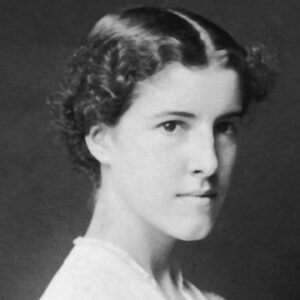Charlotte Perkins Gilman was a well-known novelist, feminist, and sociologist in the United States. Her semi-autobiography, ‘The Yellow Wallpaper,’ is her most well-known work today. She became an inspiration and a role model for the next generation of feminists who were awestruck by her avant-garde views and lifestyle through this and other works. ‘Women and Economics’ and the journal ‘The Forerunner’ are two of her other non-fiction masterpieces. She thought that women needed to be financially self-sufficient throughout their lives. She was also a strong supporter of women’s suffrage and worked tirelessly throughout her life to ensure that women were given the respect they deserved. She published a variety of highly acclaimed fiction and non-fiction works, as well as poems, essays, and criticisms, which are still studied in present times. Many of her writings became instant best-sellers, and she was praised all over the world for her never-say-die attitude and perseverance. She had cancer near the end of her life and subsequently took her own life since she was terminally ill.
Childhood and Adolescence
Charlotte Perkins Gilman was born in Hartford, Connecticut, to Mary and Frederic Beecher Perkins. Thomas Adie, her younger brother, was only a year her senior.
Her father abandoned her mother, leaving them penniless, and she had a terrible upbringing. She learned to read when she was five years old and spent the rest of her childhood in Providence, Rhode Island.
She attended a number of public schools before joining the Society to Encourage Studies at Home as a correspondent student. She did, however, only study until she was fifteen years old.
She enrolled in the Rhode Island School of Design in 1878 and supported herself by working as a trade card artist. During this time, she also became an instructor, encouraging people to express themselves creatively.
Charlotte Gilman’s Career
She was a member of the ‘Pacific Coast Woman’s Press Association,’ the ‘Woman’s Alliance,’ the ‘Economic Club,’ and the ‘Ebell Society,’ among other feminist and reformist organizations.
Her debut book, ‘Art Gems for the Home and Fireside,’ was released in 1888, and it established her as a professional novelist.
In 1890, she was inspired to write fifteen essays, poems, a parable, and ‘The Yellow Wallpaper,’ a semi-autobiographical short story about her life that became an instant best-seller.
In 1893, she published her first book of poems, ‘In This Our World,’ which garnered her worldwide fame. During this time, she also began giving Nationalism lectures, which provided her with a steady stream of money.
She worked as the editor of ‘The Impress,’ a literary tabloid produced by the Pacific Coast Women’s Press Association, from 1894 to 1895.
She launched a variety of social reform campaigns after moving to Pasadena, California, in 1896. In the same year, she embodied the Suffrage Convention in Washington, DC.
She wanted to preserve her opinions on sexual relationships and women’s economic capacities after years of travel, thus she published ‘Women and Economics’ in 1899.
‘The Home: Its Work and Influence,’ one of her best-known writings, was published in 1903. She wrote and ran her own magazine, ‘The Forerunner,’ three years later, a feat she performed for a decade. The next year, she published ‘Human Work,’ another of her well-known works.
‘According to Solomon,’ ‘Three Thanksgivings,’ ‘When I Was A Witch,’ and ‘The Cottagette’ were among the short stories she published between 1906 and 1910.
Her utopian writings ‘What Diantha Did,’ ‘The Crux,’ ‘Moving the Mountain,’ and ‘Herland’ were published in her magazine ‘The Forerunner’ from 1910 to 1911. During this time, the journal also published a number of her essays.
In 1925, she started writing her autobiography, ‘The Living of Charlotte Perkins Gilman,’ which was only published after her death. ‘Our Changing Morality,’ a non-fiction piece, was published five years later.
Her Major Projects
One of her most significant literary achievements is ‘The Yellow Wallpaper,’ a 6,000-word semi-autobiographical short story. ‘The New England Magazine’ published it in 1892, and it went on to become one of her most significant works reflecting 19th-century attitudes regarding women.
The text has been adapted into paintings, audio plays, films such as ‘The Yellow Wallpaper,’ music, and even television show due to its popularity.
In 1906, she conceptualized and launched ‘The Forerunner,’ her own magazine, which is now considered one of her finest literary achievements. From 1906 through 1916, she wrote and edited this magazine on her own, which featured some of her best articles and short tales, including ‘Moving the Mountain,’ ‘Herland,’ and ‘The Crux.’
Achievements and Awards
In 1994, she was posthumously inducted into the National Women’s Hall of Fame.
Personal History and Legacy
She married artist Charles Walter Stetson in 1884, and they had a daughter, Katharine Beecher Stetson. She had life-threatening post-partum depression shortly after giving birth.
She left her husband in 1894 and relocated to Pasadena, California, with her daughter. Katharine was later moved to live with her father and second wife.
After spending a significant amount of time with her first cousin, Houghton Gilman, she became romantically involved with him and described their connection as ‘pleasurable.’ She married him in 1900, and the couple remained married until Houghton died in 1934.
In 1932, she was diagnosed with terminal breast cancer and opted to take her life by taking an overdose of chloroform, claiming that dying of chloroform was preferable to dying of cancer. On August 17, 1935, she committed suicide.
After her death, her autobiography, ‘The Living of Charlotte Perkins Gilman,’ was released.
Her books are now being reissued for modern feminists and feminist organizations.
Estimated Net worth
Charlotte is one of the wealthiest civil rights leaders and one of the most well-known. Charlotte Perkins Gilman has a net worth of $1.5 million, according to Wikipedia, Forbes, and Business Insider.
Trivia
She was the great-granddaughter of Lyman Beecher and the granddaughter of Presbyterian clergyman Henry Ward Beecher and the author of “The Yellow Wallpaper.”


